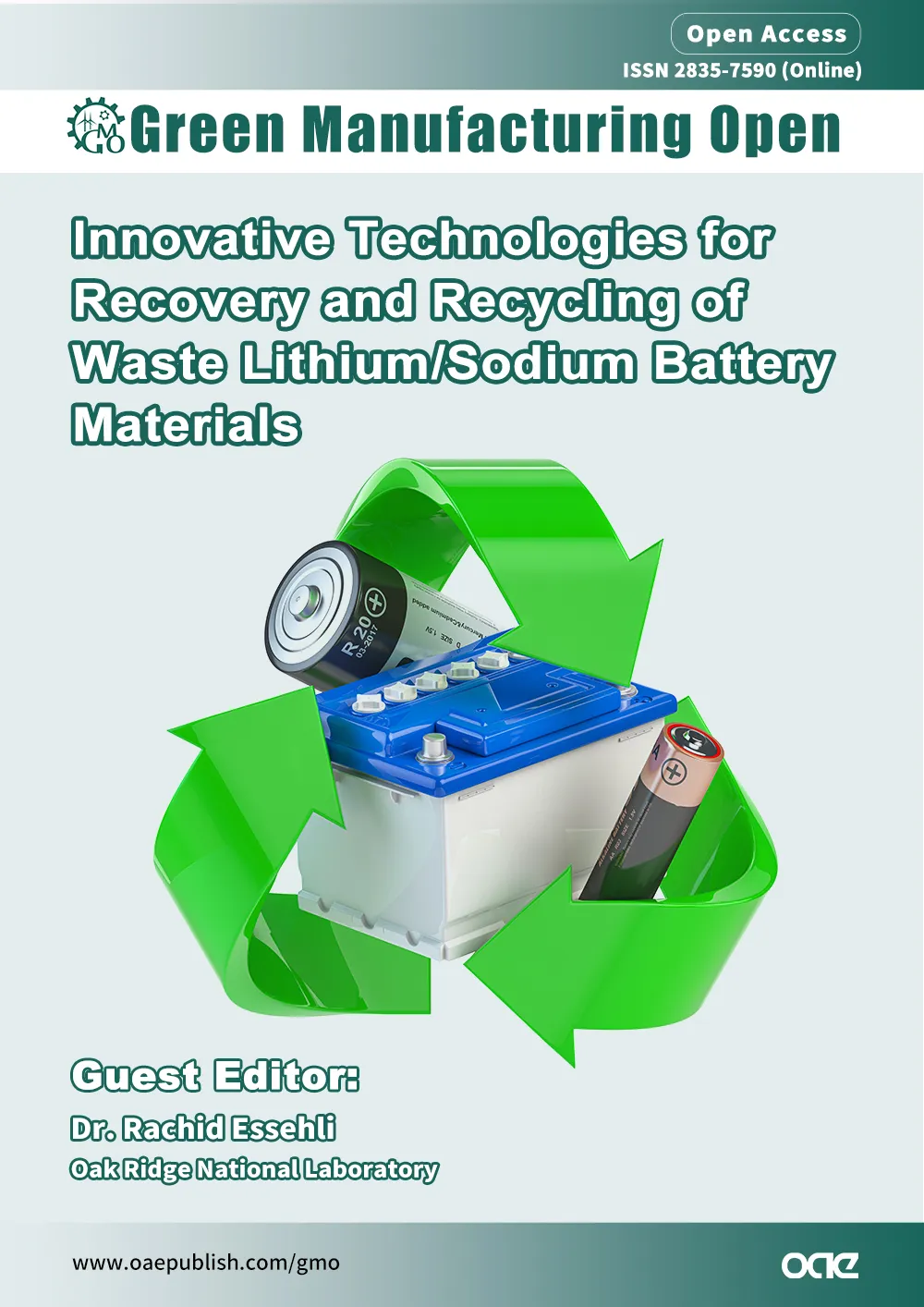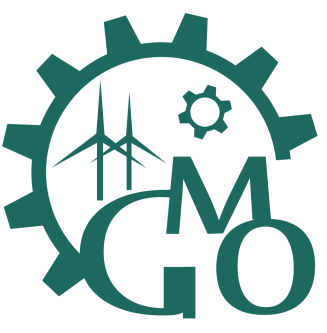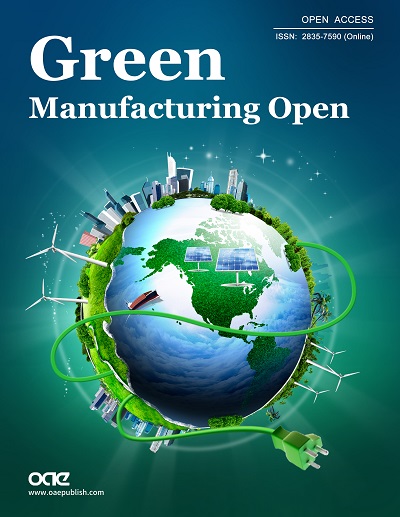
Topic: Innovative Technologies for Recovery and Recycling of Waste Lithium/Sodium Battery Materials
A Special Issue of Green Manufacturing Open
ISSN 2835-7590 (Online)
Submission deadline: 31 Jul 2024
Guest Editor(s)
Special Issue Introduction
Lithium-ion batteries (LIBs) are widely used in contemporary devices, ranging from portable electronics to electric vehicles (EVs). Growing global demands for raw materials indispensable in manufacturing LIBs, such as Co, Mn, Ni, Li, and graphite, have further stressed their already scarce supply. These surging demands can lead to risks of supply shortages, price fluctuations, and market volatility. Consequently, implementing effective recycling strategies becomes imperative to curtail dependence on virgin raw materials and promote resource preservation, environmental protection, and regional domestic circularity. In the current landscape, both emerging and recycling technologies for LIBs primarily focus on the recovery of components holding high economic value, notably Co, Ni, Li, Cu, and Al.
Presently, two primary approaches exist for chemical recycling LIBs: pyrometallurgy and hydrometallurgy. Prior to the chemical recycling step, batteries typically undergo discharge, shredding, and mechanical separation into bulk materials, such as plastics and metals, and a powder containing active anode and cathode materials, often referred to as black mass. Pyrometallurgical recycling necessitates the application of elevated smelting temperatures (>1000 °C) to convert the cathode materials into matte composed of transition metals, specifically nickel and cobalt. This method, however, involves substantial energy consumption and emission of airborne pollutants and leads to loss of the lithium and manganese to the slag. Additionally, the process releases greenhouse gases from the decomposition of carbon-based materials, including binders, graphite, and electrolyte materials.
In contrast, hydrometallurgical recycling methods, which include leaching, precipitation, and solvent extraction, aim to recover valuable transition metals, e.g., Ni, Co, and Mn, by dissolving them into a solution using lixiviants (1) inorganic acids: H2SO4, the only one used in industrial processes, and others acids using in the research fields such as HNO3, and HCl, and (2) organic acids: for example, citric acid, malic acid, aspartic acid, oxalic acid, and ascorbic acid. These dissolved metals are subsequently reconstituted into mixed metal hydroxides (MHP; M(OH)2), individual metal sulphates (MSO4.nH2O), metal oxalates (MC2O4), and metal citrates (M(C6H6O7)·H2O) through a series of engineered chemical processing steps. Compared to pyrometallurgical techniques, hydrometallurgical methods achieve higher selectivity, increase recoveries, and yield value-added products. Recycling end-of-life LIBs and manufacturing scrap from LIB production offers a potential solution to mitigate supply chain risks associated with critical materials. Nevertheless, depending on the technologies employed, the recycling processes for LIBs may give rise to issues such as water pollution from leachate, generation of solid waste similar to metal-rich ash, and air pollution. Thus, there is a pressing need to develop economically viable and environmentally sustainable recycling technologies, particularly for the cathodes of spent EV LIBs.
Presently, two primary approaches exist for chemical recycling LIBs: pyrometallurgy and hydrometallurgy. Prior to the chemical recycling step, batteries typically undergo discharge, shredding, and mechanical separation into bulk materials, such as plastics and metals, and a powder containing active anode and cathode materials, often referred to as black mass. Pyrometallurgical recycling necessitates the application of elevated smelting temperatures (>1000 °C) to convert the cathode materials into matte composed of transition metals, specifically nickel and cobalt. This method, however, involves substantial energy consumption and emission of airborne pollutants and leads to loss of the lithium and manganese to the slag. Additionally, the process releases greenhouse gases from the decomposition of carbon-based materials, including binders, graphite, and electrolyte materials.
In contrast, hydrometallurgical recycling methods, which include leaching, precipitation, and solvent extraction, aim to recover valuable transition metals, e.g., Ni, Co, and Mn, by dissolving them into a solution using lixiviants (1) inorganic acids: H2SO4, the only one used in industrial processes, and others acids using in the research fields such as HNO3, and HCl, and (2) organic acids: for example, citric acid, malic acid, aspartic acid, oxalic acid, and ascorbic acid. These dissolved metals are subsequently reconstituted into mixed metal hydroxides (MHP; M(OH)2), individual metal sulphates (MSO4.nH2O), metal oxalates (MC2O4), and metal citrates (M(C6H6O7)·H2O) through a series of engineered chemical processing steps. Compared to pyrometallurgical techniques, hydrometallurgical methods achieve higher selectivity, increase recoveries, and yield value-added products. Recycling end-of-life LIBs and manufacturing scrap from LIB production offers a potential solution to mitigate supply chain risks associated with critical materials. Nevertheless, depending on the technologies employed, the recycling processes for LIBs may give rise to issues such as water pollution from leachate, generation of solid waste similar to metal-rich ash, and air pollution. Thus, there is a pressing need to develop economically viable and environmentally sustainable recycling technologies, particularly for the cathodes of spent EV LIBs.
Keywords
Pyrometallurgy hydrometallurgy, direct recycling (e.g., direct recycling and upcycling of cathodes, advanced separation methods, anode recycling, electrolyte recovery), pCAM, MHP, new designs and materials to facilitate recycling and Recycling manufacturing scraps
Submission Deadline
31 Jul 2024
Submission Information
Ten articles in the Special Issue are exempt from article processing charges.
For Author Instructions, please refer to https://www.oaepublish.com/gmo/author_instructions
For Online Submission, please login at https://oaemesas.com/login?JournalId=gmo&SpecialIssueId=GMO231208
Submission Deadline: 31 Jul 2024
Contacts: Stefan Wang, Assistant Editor, Stefan@oaeservice.com





